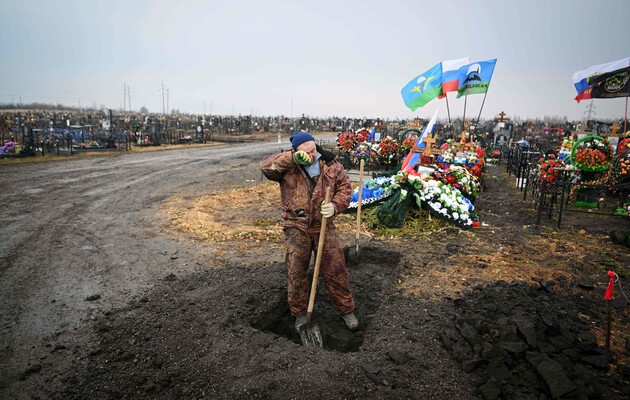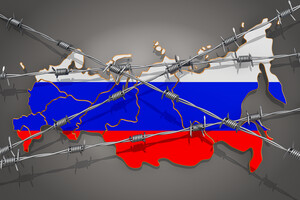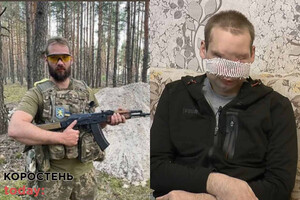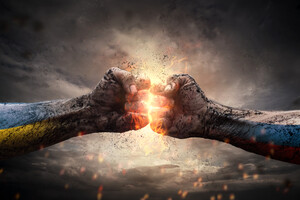Ukraine is not Vietnam: why the Russians are ready to kill "their boys" endlessly

At the beginning of the war, the greatest optimists assumed that, faced with the exorbitant cost of the war, namely poverty and human losses, the Russian people would say that it is enough to conduct military operations and force the Kremlin to abandon the war in Ukraine. In addition, experts assumed that in verbal protests against the war, Russian ordinary people who would not want to be sent to die in the war in Ukraine, and Russian intellectuals-liberals who have a conscience and understanding of the words "international law" will speak out. It was also expected that even Russian nationalists such as Dugin or Girkin and Strelkov would later speak out regarding the cessation of hostilities on the territory of Ukraine because they understand that the Ukrainian war destroys the stability of the Russian Federation. After all, there are cases in history when this is exactly what happened. For example, the Americans, who at first enthusiastically accepted the war in Vietnam, quickly understood how the situation was really unfolding and forced their government to withdraw its troops.
However, time goes on and Russia is already preparing for the next wave of mobilization, and the Russians' support for the war in Ukraine does not intend to decrease. What's more, the number of people who demand "to carry out military actions to victory" is growing. And the thing here is not only the victory of convincing clichés of television propaganda over the inconveniences for people after the introduction of economic sanctions.
Pogani.ru: from Kandahar to Bakhmut
The habit of the Russian citizen to react to stimuli only when they directly concern his private life leads to those strange – in our opinion – conclusions that we observe in the Russian segments of information reality. Economic difficulties, the possibility of being mobilized, and the abundant flow of funerals are not attributed to the Kremlin, which sent "their boys" to Ukraine – this is a too long and morally complex cause-and-effect relationship. There is a much shorter and simpler way: young Russian boys are killed by Ukrainians. Therefore, they (that is, we) are enemies.
There is nothing new or surprising in this for a country that not only calls itself, but in recent years is the direct successor of the USSR. A direct analogue of the Ukrainian war is the war that took place in Afghanistan. Which was also not called a "war", but a special operation within the framework of "international aid to the brotherly Afghan people". At that time, in the USSR, no one could even think of sympathizing with the Afghans, and Brezhnev and Ustinov were reprimanded only by stubborn dissidents.
The enemies were the Mujahideen, who defended their land and their right to dispose of it. But this did not resonate in the souls of viewers of the news program called "Time". The Mujahideen were "killing our boys" – that was all that mattered. The entire culture of "Afghans" praised the frontline brotherhood in sentimental songs and did not ask what we were doing there and why. It is not by chance that the Afghan chanson is so similar to the prison chanson in its meaning and message. The lyrics of most of the songs describe the difficult life of the people, mourn for the fallen comrades, glorify the fighting brotherhood, condemn cowardice and betrayal, and express dissatisfaction with the superiors. And never asks the fundamental question: "How did we get here?" With the way people end up in prison, in general, everything is clear. However, how to answer the question about the expediency and reason for starting the war?
Any doubt about the expediency of the introduction of the war resulted in the same cursed question: "So, the boys died in vain?". In 99% of cases, the person who asks this question considers it rhetorical. To interpret it otherwise would be heresy, even more, treason, because it called into question the sacrifice made.
Love in the Russian way
That is why we do not have to hope for a "Vietnamese variant of the unfolding of events", when the people will begin to demand from their own authorities to stop the war.
According to a survey by the Levada Center, at the beginning of the full-scale invasion, 68% of Russian citizens supported the "actions of the Armed Forces of the Russian Federation in Ukraine." Less than a year later, in January 2023, support increased to 75%. It is worth noting that the majority of Russian citizens have not understood what is actually happening on the territory of Ukraine, despite the fact that "their boys" are dying.Moreover, in a paradoxical way, their death only warms up the desire of the common man to continue the so-called military special operation.
It could be said that the Americans also did not immediately understand that they did not need the war in Vietnam. After all, it took almost twenty years and 58 thousand dead "boys" for the USA to turn over this dubious page of its history. But let me remind you that the Russian-Ukrainian war did not start yesterday either – it has been going on for more than nine years. And its beginning was marked by the first military crime of Russian troops in Ukraine, namely the downing of a passenger plane. The Russians had plenty of time and reasons to rethink their actions and policy towards Ukraine. However, "our Ukrainian boys" who have already suffered and received numerous injuries during the war have different effects on the American and Russian people.
The Americans forced their government to end the war not at all because they like the Vietnamese. They did not care about the fate of the Vietnamese in the same way that most Russians do not care about the Ukrainians now. Americans forced government officials to end the war in Vietnam because they did not want to die and bury "their boys" for reasons that did not seem to them to be sufficient for such sacrifices. They asked questions about the "boys" and what they were dying for, absolutely seriously. And when the American people decided that their "boys" were still dying in vain, this message worried their entire society. Their rock stars sang about it in stadiums, their teachers talked about it in schools, their journalists talked about this fact on their radio chats, TV channels, newspapers and magazines. In addition, secret service employees leaked secret reports to the press about the true state of affairs on the Vietnamese front.
Americans decided that living "boys" are more important to them than searching for meaning among corpses. The Russians make another choice, which is to sacralize the death of their soldiers. And they are honest in their own way: they never loved their "boys", never considered them "theirs" before. They were not surprised that their "boys" killed, robbed, raped and tortured. After all, the Russian citizen has always known that they are capable of this, and is partly even grateful to his government for the fact that it gave the "boys" the opportunity to do this with others, and not with those who now call them "their own". The "boys" became "their own" only when they went to war and ceased to be a hidden or overt threat. And even more, they began to be considered "their boys" when they died. The concept of "own" outside the context of war and death for most Russians remains rather vague and extends to a very, very narrow circle.
Where does the Motherland begin?
The Kremlin is well aware and probably contributed to the fact that Russia as a country remains just a territory. Putin has personally revealed the secret behind his unlimited power over a huge country: Russia does not end anywhere. But this was only half the truth, which we readily grasped with our colonial traumas. The fact that "Russia does not end anywhere" really poses a problem for us. And also such a problem exists for Georgia, Chechnya, Belarus, Moldova, the Baltic states, at various levels of government.
The second half of the truth, which was not voiced by the owner of the Kremlin, concerns the Russians themselves to a greater extent: Russia does not begin anywhere. It is impossible to feel it under your feet as a certain physical given, as a basis on which you can stand and which you can defend – both in front of your own people and in front of others. War – with Ukraine or with anyone else – turns out to be almost the only moment when the mass of people inhabiting a certain territory begin to vaguely feel like a kind of community. United, if not by joint creation, then at least by joint destruction. Not a joint mission, but at least a joint crime. Russia represents a society that is united, if not by common well-being, then at least by common grief. Not a common goal, but at least a common enemy. And ordinary citizens of Russia, as well as the Russian intellectual, only at this moment more or less clearly feel needed. That's when people in Russia feel like they're part of something bigger than just themselves. They get what every human soul secretly longs for, namely a sense of community. The same "boys" die precisely for this state of mind and in order to give the population of the territory at least a short-term sense of community. They die so that Russia can feel at least some limit: if you have enemies, then you exist.
Ordinary Russians trust their government. They do it not out of stupidity, not because of "brainwashing", it is a voluntary agreement that provides for the possibility of not taking on the work and responsibility for the fate of the Motherland. The motherland and its destiny have always depended so little on the will of the average citizen that these concepts have long since melted into something abstract and blurred in the understanding of a simple Russian. Therefore, there has been a tradition for a long time that it is easier and better for the fate of the state to simply leave it in the hands of the right leader and not interfere in decision-making, because it is impossible to influence anything in particular.
The mass of the Russian population, which leads a rather ascetic way of life, has never produced a more or less noticeable middle class. Not in financial terms (although the middle class of the population was not created in that regard either), but in terms of understanding the sources and guarantees of one's own well-being and readiness to defend them. Ordinary Russians inherited from the Soviet people a specific "privilege" – "not to interfere in politics." Also, usually people in Russia are used to not thinking about the prospects of the country as a collective organism. Do not analyze the decisions and actions of the authorities. And not even to correlate them with one's own private life. "No one knows the truth", "politics is a dirty business", "our politicians lie, theirs lie too" – with a set of such clichés, the average Russian citizen dismisses the very thought of responsibility for his country and, ultimately, even for his own life.
Without the existence of a middle class ready to take responsibility for political decisions made in the country, Russia never became a full-fledged country. Russians should take an active part and take responsibility in the politics of the state, if only because the private well-being of people is connected with various decisions. Currently, Russia remains a territory full of various resources (including human resources), which the authorities consider theirs and use at their own discretion and completely without control. And there is nothing "criminal" in this on the part of the Kremlin, because this is what the "social contract" looks like in Russia. Why the Russian Federation turned out to be a failed state is the subject of a separate conversation. Here it is only worth noting that this state of affairs has become extremely dangerous for us.
Ukrainians really want to brush it off and say that it is not our problem, so to speak. However, unfortunately, this is not the case. The fact is that Russia will not disappear from the world map, no matter on what terms our war would end and no matter how much we would like to see the end of this new-old "evil empire". Therefore, it is better to learn to look at things directly and not to nurture illusions. It is worth understanding that neither "good" nor "bad" Russians will help us in this war. Thus, no "Vietnamese version of events" is foreseen for us. And that's good in its own way. After all, when you look through the scope, it is better to have a clear view. Enemies will always remain enemies. Therefore, we will fight as much as we can.
Read this article in russian and Ukrainian.
Please select it with the mouse and press Ctrl+Enter or Submit a bug
















 Login with Google
Login with Google